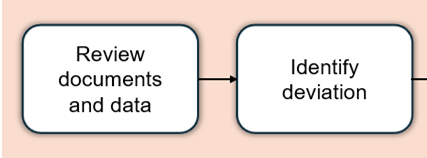Section 1.1 Identification

Review Documents and Data

Each unit will have a process for identifying and managing deviations. Similarly, each trial will have its own guidelines and criteria for determining whether deviations should be recorded within the trial or whether they also require more formal reporting for expedited/individual review, usually based on severity and scale of the issue.
Regardless of individual processes, all deviations should be logged in real-time at the point of identification. Often further investigation is required, such as a root cause analysis and an impact assessment, however all available details should be included at the point of initial recording.
Identify Deviation

There are many ways to identify deviations, with one of the most common being following monitoring activities at a site/vendor. Deviations can also be identified via:
– Site self-report: site processes not followed e.g. GP letters not sent, untrained staff, missed visits, documentation not collected from participants
– Data management processes: poor data quality, delayed data query resolution, missed visits/missing data
– Laboratory processes: sample collection issues, missing or unusable samples, sample documentation incorrectly completed, sample processing or analysis issues
– Pharmacovigilance processes: late reporting, delays with follow-up information, missing data
– Consent review processes: consent forms incorrectly completed, consent taken by staff not delegated or trained
– Central monitoring processes: logs incorrectly completed, missing data
– IMP management/randomisations systems: incorrect kit codes dispensed, unnecessary unblinding, IMP supply issues.
Deviations are usually identified continuously throughout the trial. However certain checks may only be performed periodically such as certain data checks for data cleaning prior to a Data Monitoring Committee meeting or safety data reconciliation prior to a Development Safety Update Report (DSUR) submission.
At the start of your trial, it’s important to consider how your deviations will be reviewed, by whom and how the data will be used when deciding how best to log them. Data will need to be looked at in different ways in order to look for trends/significant issues not only for ongoing trial management purposes but also to ensure that all planned trial analyses account for any major deviations. Your data collection method needs to be designed in such a way that the data collected during the trial can be analysed to look for patterns, such as:
– Issues with a particular assessment or visit
– Particular types of issues e.g. patient safety, consent process, IMP
– The number of deviations per site and if there are any outliers across the trial
– The number of a specific type of deviation e.g. Major/Minor and if there are any outliers
– Issues with a particular site either in this trial or across trials
It is important that there is consistency across the reporting forms and logs and also across the trials to facilitate wider review, trend analysis and to draw appropriate conclusions.
At the end of the trial all major deviations need to be included in the CSR or publication, so accurate, contemporaneous records are imperative to ensure compliance with this.








